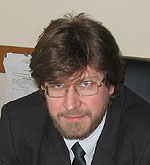© «Russia in
Global Affairs». № 2, April — June 2009

The global economic crisis remains the focus of everyone’s
attention, but the panic of late last year has given way to a sober
analysis. The world has not been turned upside down and the
problems caused by the crisis have only become catalysts of
processes that had begun to take shape long before the autumn of
2008.
The contributors to this issue are trying to understand how the
changes in the economic situation could affect Russia’s development
prospects. Dmitry Furman discusses the now popular subject of the
prospects for the liberalization of Russian politics. Russian
history has many examples of cyclical changes from harsh to soft
regimes and vice versa. But as long as the impulse for change comes
from the top rather than reflecting the demands of society, there
will be no chance for a real democratic system in Russia.
Alexander Auzan believes that the crisis has put an end to the era
of a tacit social contract that has existed in Russia de facto
since the early 2000s, set up according to the formula “well-being
in exchange for civil rights.” The active participation of civil
society in efforts to overcome economic problems is a guarantee of
the country’s further development. Dmitry Badovsky views the
prospects for Russia’s modernization in light of a deepening
decline. Vladimir Shveitser analyzes the transformation of the
party system in post-Soviet Russia and concludes that the present
model is vulnerable, especially amid economic problems.
The chairman of Russia’s Constitutional Court, Valery Zorkin, draws
the readers’ attention to legal challenges caused by the global
crisis. He warns about a threat to the civil, and especially
social, rights of man, whose importance is usually
underestimated.
Vladislav Inozemtsev warns against overestimating the scale of
the global changes. In his view the leading Western economies,
above all the United States, are capable of coping with the present
situation, so there are no grounds to compare the present
developments with the Great Depression.
Sergei Karaganov writes about the “unfinished history” of the 20th
century. He argues that the page of the Cold War has never been
turned, which prevents moving forward to meet the real dangers of
the new century. Russia and the West need a new start. Dennis
Kredler proposes discussing close integration between Russia and
the European Union. Mikhail Troitsky analyzes the influence of
“frozen conflicts” on Russian-U.S. relations and the prospects for
U.S. policy. Hansj?rg Haber calls for co-operation in stabilizing
the situation in the zone of confrontation in the Caucasus.
Alexander Lukin emphasizes the need for reinforcing the Asian
vector of Russian foreign policy. He argues that Moscow, throughout
the post-Soviet years, has put too much focus on its relations with
the West, while overlooking processes that are unfolding east of
its borders. Sergei Luzyanin discusses the role of the Shanghai
Cooperation Organization (SCO) in Russian foreign policy. He
believes that the SCO has a great potential for development and is
becoming quite an influential regional organization.
Vassily Belozyorov warns about potential conflicts that may stem
from the competition for water resources. This problem is
particularly acute in Central Asia. Jahangir Karami offers an
Iranian view of problems in the region. Alexander Ignatenko
analyzes U.S. policy vis-?-vis the Islamic world, pointing out that
a majority of the problems has been caused by Washington’s policy
over the last few decades.










